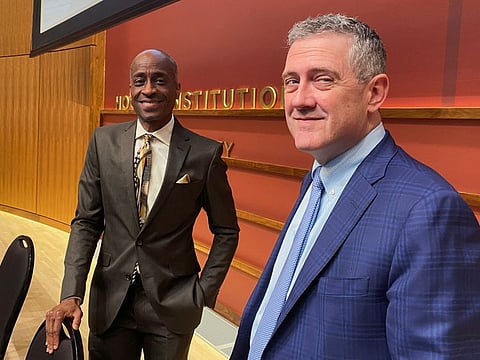Fed’s Jefferson says inflation high, but policy ‘on track’
US CB earlier this month indicated that it may be ready to pause its rate-hiking campaign

California: Federal Reserve Governor Philip Jefferson said progress on inflation this year has been “mixed,” but noted that policy takes time to percolate through the economy and is “well on track.”
“Outside of used motor vehicle prices, which fell unexpectedly in March, disinflation in core goods prices is occurring at a slower pace than expected,” Jefferson said in prepared remarks at Standford University’s Hoover Institution in California. “Monetary policy affects the economy and inflation with long and varied lags, and the full effects of our rapid tightening are still likely ahead of us.”
His remarks came just hours after President Joe Biden said he would nominate Jefferson to the position of vice chair. Jefferson said he was honored and humbled by the news. He will need to be confirmed by the Senate to be elevated to the Fed’s No. 2 spot.
The US central bank earlier this month indicated that it may be ready to pause its rate-hiking campaign, which last year included four consecutive 75-basis-point increases before a slowdown in the last six months, as it assesses how the policy works its way through the economy.
But policymakers haven’t committed yet to an end-date for the hiking cycle, saying instead they are pivoting to a meeting-by-meeting approach to decision making and weighing all available data as inflation has cooled more slowly than many had expected.
“Monetary policy is now at the low end of what is arguably sufficiently restrictive given current macroeconomic conditions,” he said in a presentation prepared for the Stanford event, but noted that the restrictive zone can move in reaction to incoming data.
He also said it’s encouraging that market-based inflation measures have returned to levels consistent with the Fed’s 2 per cent inflation target.
“The fiscal stimulus is receding, and monetary policy has been adjusted rapidly in the last year to better align with traditional central bank strategy,” he said. “Accordingly, the prospects for continued disinflation are good but not guaranteed.”
The consumer price index posted its first sub-5 per cent reading in two years last month, a report showed earlier this week. Core prices also cooled, though remain at a higher level.
Jefferson said recent bank stress following the collapse of several mid-size US lenders may lead to tighter credit conditions going forward, which may add to the Fed’s efforts to cool the economy.
“The tightening in financial conditions we have seen in response to our monetary policy actions is likely to be augmented by the effects on credit conditions from recent strains in the banking sector,” Jefferson said.
But credit restraints may only have a “mild” negative impact on economic growth, as the turmoil was isolated and swiftly contained, he said, adding there is still “significant uncertainty” around credit in the coming year.
Sign up for the Daily Briefing
Get the latest news and updates straight to your inbox



